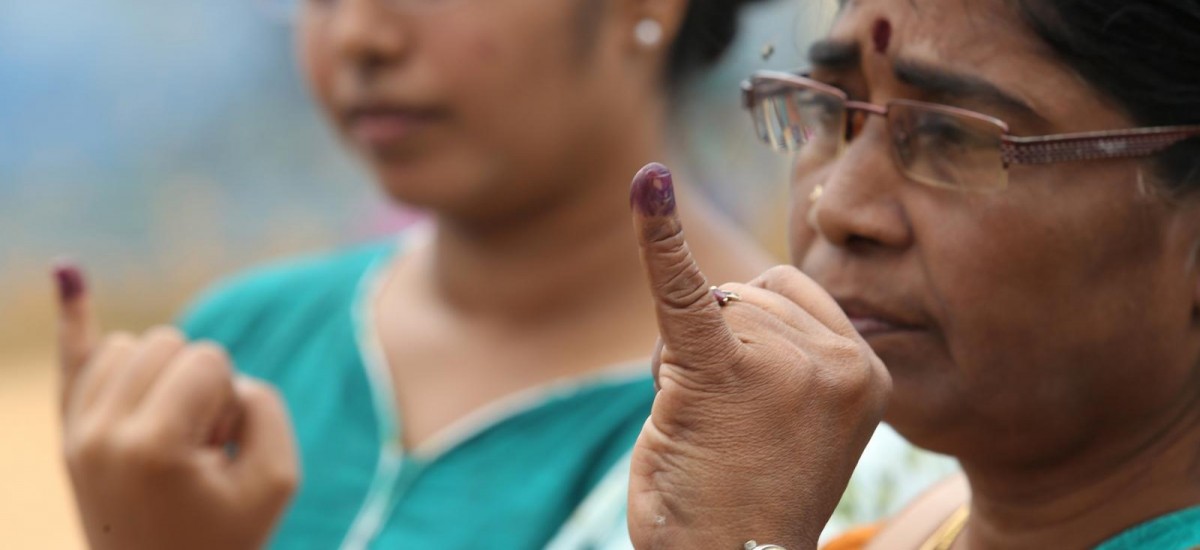Photo by Buddhika Weerasinghe/Getty Images
The elections to the North Western, Central and Northern provincial councils are over and the results have been largely as many political analysts predicted. The UPFA won in both the North Western and the Central provinces, while the Tamil National Alliance (TNA) romped home in the North. The political landscape though remains largely unchanged subsequent to the polls, with the polls reiterating but not altering the political dynamics that existed since the end of the war and the presidential and parliamentary elections of 2010.
UNP badly defeated
The ruling United Peoples Freedom Alliance (UPFA) retained in the recent elections a 66% and a 60% popular vote share in the North Western and Central provinces respectively, roughly similar to the 69% and 59% they secured in the same provinces 2009. In fact in both provinces the UPFA increased their absolute number of votes and in the Central province, moved up from 59% to 60%.
In sad contrast the United National Party saw its percentage of the popular vote actually erode in both provinces. In the Central province the UNP went down from the 38% they polled in 2009 down to 27%, while in the North Western province they went down from 28% to 24%. In an election that saw over one hundred thousand additional voters in both the North Western and the Central Provinces, the UNP actually polled less votes in 2013 than they did in 2009. So the UNP did not just loose votes only in relative terms, they lost votes in absolute terms. Thus the UNP General Secretary’s proud pre election claim that they will actually poll more votes than they did in 2009 was proved wrong, as the party actually polled a whole lot less. It would be wise for the UNP Working Committee, that precocious group of persons, to contemplate the sorry plight of their party. In the Northern province, the UNP’s 0.6% of the popular vote is not merely an embarrassment, it is farcical.
The Rajapakse regime must be feeling vindicated, that despite impeaching the Chief Justice, despite turning the military loose to brutally assault and shoot dead villages’ demanding unpolluted potable water in Weliweriya, despite increasing electricity tariffs by nearly 40%, despite allowing places of Muslim and Christian religious worship to be attacked with no effective preventive or corrective action, that they poll over 60% of the popular vote amongst about 2.3 million voters in two provinces. Possibly more an indictment on the UNP, than an endorsement of the regime.
TNA sweeps the North
The Northern Provincial Council elections of 2013, will be noted in history as the first election that the Rajapakse regime lost and lost big. The Tamil National Alliance (TNA), led by Rajavarothiam Sambanthan, won a resounding victory in the North, getting almost four fifths (4/5) of the popular vote at 78.5% and about the same proportion of the seats or 30 out of 38 seats, in the provincial legislature. That the TNA pulled this off despite, all the kings horses and all the kings men, being deployed against it was indeed an amazing performance for the regional ethnic minority political party and surpassed expectations. The UPFA as a government demonstrated just how alienated it is from the Tamil people of the North, by getting just 18% of the popular vote. Clearly governance in the North, whether by the Presidential Task Force or the Governor, that ignores and does not engage the TNA, would be completely unrepresentative of the local people and communities. However hard work lies ahead for the TNA and its newly elected Northern Provincial Council, to make the Council work for the benefit of the Tamil people of the North. Basically Northern Chief Minister elect, retired Justice C.V.Wigneswaren would have his work cut out for him and would have to replicate what Mayor Muzzamil has accomplished in Colombo, running the country’s largest municipality as a UNP controlled council in the context of a UPFA central and provincial administration.
Democratic Party comes of age as the third player while JVP declines further
Just when we thought the JVP was at rock bottom, they sink to new lows, getting about 1.5% of the popular vote, demonstrating that there is no political space for them to occupy, since the UPFA has run off with their political clothes.
A winner of sorts at the provincial polls was the new Democratic Party (DP) of retired General Fonseka, who firmly established itself as the third force in Sri Lankan politics securing about 4% of the popular vote and five seats in the two provincial councils. The Machiavelli of Madamulene’s political calculations were right when he released General Fonseka from custody, that General Fonseka would split the opposition vote and eat into the UNP support base, further weakening an already ineffective opposition. A quick analysis of the Democratic Party vote would indicate that it came largely at the expense of the UNP. General Fonseka and the Democratic Party has not really added to or increased the size of the opposition support base, it has merely cannibalized support from the UNP, which really means that General Fonseka and the DP, is not effectively taking on the Rajapakse regime either.
Basically the provincial polls has merely reiterated and strengthened the political realities which existed before the election. President Rajapakse demonstrates that he is hugely popular among the Sinhala voters, while the TNA demonstrates that they are similarly popular among the Tamil people. These two facts, we knew with certainty even before the elections, though the polls reinforce that. The real challenge is will the UPFA and the TNA, or more correctly would President Rajapakse and R.Sambanthan restart their structured political dialogue and engagement or not. For the sake of both their constituencies and the nation as a whole, we would all hope so.

